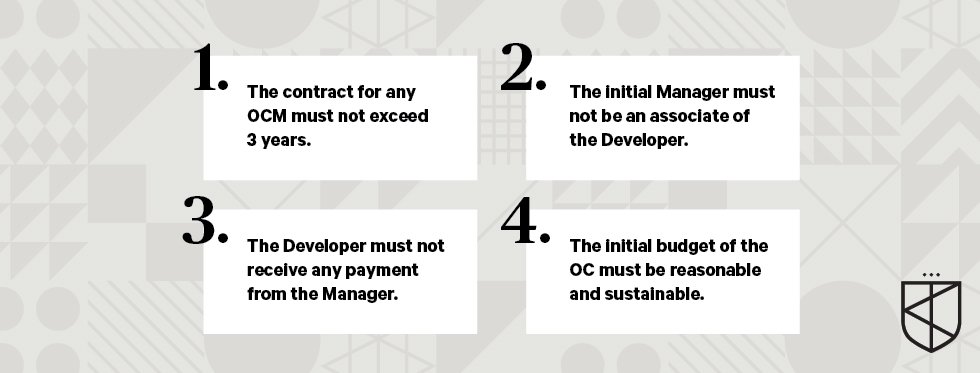
In May of 2019, an Exposure Draft of the proposed changes to the Owners Corporations and Other Acts Amendment Bill was released. Included within the draft were a range of changes to the legislation that will result in increased consumer protection and professionalism in the Owners Corporation industry.
A number of these changes affect the responsibilities and obligations of the Developer, in relation to the establishment and management of an Owners Corporation. We believe these changes will have positive ripple effects, providing greater protection to Owners and raising the reputation of Owners Corporation Managers (OCMs) and Developers alike.
The Amendment Bill was introduced into Parliament in the later parts of 2019 and is currently going through the Parliamentary Process. Should the bill be approved, the changes will come into effect by the 1st January 2021, so here are some of the key changes Developers should be aware of.
1. The contract for any Owners Corporation Manager must not exceed 3 years.
Historically, many Developers have signed long term contracts with the initial Owners Corporation Manager, locking Owners into often undesirable arrangements for unreasonable periods.
These long-term contracts are often laced with clauses making it difficult or expensive for the Owners Corporation to change Manager.
With the proposed changes to the Act this will be a thing of the past, capping the term of a contract at 3 years.
2. The initial Manager must not be an associate of the Developer.
Some Developers have set up an Owners Corporation arm of operations, enabling them to effectively appoint the Management contract in-house and retain the revenue stream that comes along with it.
While this may seem harmless enough, Owners Corporation Management is a complex and ever-changing industry, and much of the required experience and expertise is often missing when these partner-OCMs are appointed.
Protections against this are set to be introduced, with Section 68(4A) of the Draft Bill stating that ‘the initial owner of land affected by an owners corporation or an associate of an initial owner must not be appointed as the manager of the owners corporation.’
Furthermore, at the initial meeting of the Owners Corporation, any relationship between the Developer and the Manager must be disclosed and documented within the minutes of the meeting, ensuring greater transparency for purchasers.
3. The Developer must not receive any payment from the appointed Manager.
Partnerships between Owners Corporation Managers and Developers are commonplace within the industry. These partnerships often benefit both parties; Developers may receive a commission from the Manager, and in return the Manager receives a steady flow of business from the Developer.
The result of these partnerships, however, is an appointed Manager who does not necessarily have the skills or resources to effectively Manage the property, and qualified or more suitable candidates are not even considered.
Section 68(4B) will effectively make these partnerships defunct, stating that ‘the initial owner of land affected by an owners corporation must not receive any payment from the manager of the owners corporation in relation to the manager’s contract of appointment.’
4. The initial budget of the Owners Corporation must be reasonable and sustainable.
The preparation of a budget is one of the most important steps in the establishment of the Owners Corporation. The budget determines the levies which Owners will have to pay, which can be a deciding factor for prospective buyers.
Unfortunately, this has given rise to a practise of excluding certain ongoing costs from the initial budget to make it appear as though levies will be more affordable. This is a misleading tactic which is employed by some Developers to encourage sales, but equally by some Owners Corporation Managers to win the management contract.
Section 68(4B) of the Draft Bill also addresses this, requiring Developers to put forward an initial budget that is both reasonable and sustainable. Furthermore, Section 42 of the Draft Bill states that a Tier One Owners Corporation (51 or more occupiable lots) must prepare and approve a Maintenance Plan. This means that the Maintenance Plan levy component must be included in the initial budget put forward by Developers.
This responsibility upon Developers will result in more honest behaviour from Owners Corporation Managers, who will no longer be able to use an unrealistic initial budget to undercut their competitors and win the contract. The upshot here, of course, is purchasers being able to trust the fees quoted to them by the Developer and avoiding the shock of a sharp increase in fees in the second year of Ownership.
While these changes will have an impact on some of the common practises of Developers and Managers alike, it is our belief that ultimately, they will result in higher levels of integrity, professionalism, and expertise within the OC industry.
This will in turn raise the reputation and brand satisfaction for Developers, ensuring purchasers are happy in their new homes for many years after settlement occurs.
The Knight has provided guidance & expertise to some of Melbourne’s leading Developers. Find out how we can assist on your next project.

